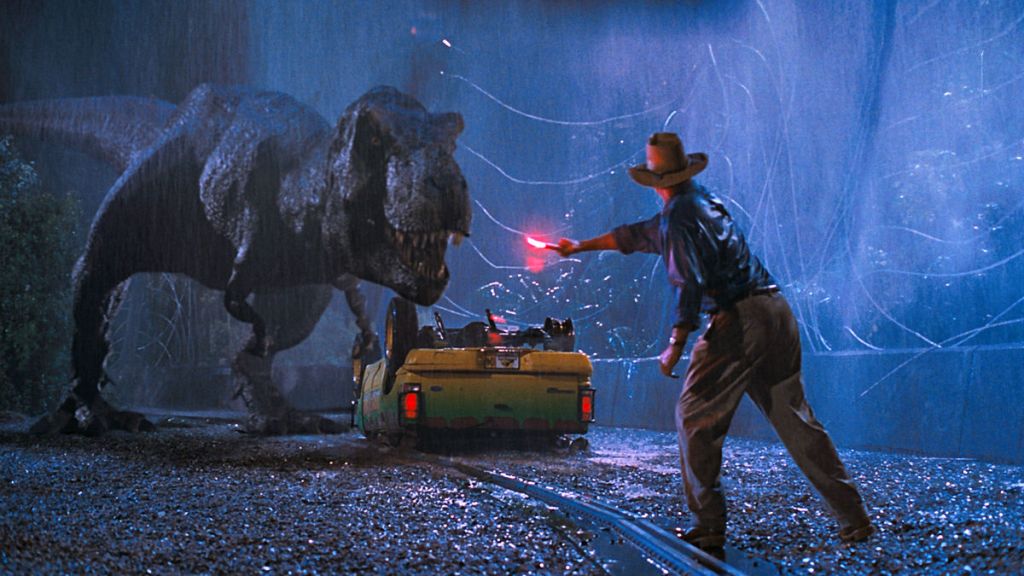Why on Earth are dinosaur movies so darn tricky to pull off? Ever since 1993, when Steven Spielberg’s Jurassic Park stormed onto the silver screen, we’ve witnessed a menagerie of dino adventures, but few have truly hit the mark. From Disney’s animated flick Dinosaur, which received mixed reviews and tepid audience reactions, to forgettable bottom-of-the-barrel B-movies like Carnosaur, there’s no shortage of poorly made dinosaur adventures for audiences to consume.
Even the great Spielberg stumbled in his attempts to recapture the awe-inspiring grandeur of Jurassic Park. The sequel, The Lost World: Jurassic Park, left much to be desired, and the subsequent Jurassic Park III and Jurassic World trilogy couldn’t quite muster up the same staying power.
But what exactly made Jurassic Park a roaring success? Even after all these years, it remains the apex predator among dinosaur movies — a true titan of the genre. It’s jam-packed with suspense, mind-blowing effects, and jaw-dropping action. Yet, if we’re being honest, the story itself, based on Michael Crichton’s novel, is rather straightforward. It spends mere minutes debating the ethical conundrums of cloning, throws in a group of stock characters, and then unleashes them into the wild to tussle with dinosaurs.
Simple.
Characters are straightforward but memorable. We’ve got the soft spoken paleontologist, Dr. Alan Grant (Sam Neil), who hates kids. Then there’s the passionate paleobotanist, Dr. Ellie Sattler (Laura Dern), who has a flair for the dramatic, eccentric mathematician, Dr. Ian Malcolm (Jeff Goldblum), who’s as quirky as they come. And of course, we’ve got a pair of wide-eyed, scream-prone kids, Lex and Tim (played by Arian Richards and Joseph Mazzello, respectively), who are just along for the dino-filled ride. Sure, it’s a basic bunch, but hey, it works!
And work it does, people! Jurassic Park stands tall as a colossal triumph, casting a shadow over the majority of summer releases. This isn’t merely nostalgia clouding our judgment; Jurassic Park rocks. Sure, there are a few dated bits here and there (remember those clunky computers and ancient CD-ROMs?), but overall, the film has an undeniably modern look and feel, even as Spielberg follows an old-school mantra that keeps us in suspense, waiting for the thrills to unfold rather than bombarding us with non-stop CGI mayhem.
In this dino park, less is definitely more.
The first hour teases us with glimpses of the park’s razor-toothed residents, carefully building anticipation. When all Hell breaks loose, Spielberg unleashes the mighty Tyrannosaurus Rex on our hapless heroes, and crafts this magnificent sequence:
Similarly, Spielberg lays the groundwork for the villainous Velociraptors, but waits until the third act to deliver the goods:
Moreover, Spielberg shies away from gore. When a dinosaur pounces from the forest to feast on an unsuspecting visitor, the Beard cleverly shields us from the carnage with some well-placed tree branches. And when a T-Rex chomps down on a hapless lawyer who thought hiding on a toilet was a solid plan, we only catch a partial glimpse of the horror. Instead, we find ourselves laughing too hard to worry about the gruesome details. Nedry’s death is the perfect example of restraint — shocking enough to scare us silly, but tame enough to keep the little ones from fleeing the theater in terror:
It’s this delicate balance that makes Jurassic Park a hard-hitting adventure for both adults and youngsters alike. It’s the perfect epic for the whole family, and it represents the pinnacle of Spielberg mania, a time when every summer seemed to offer up a PG-13 thrill ride that left everyone grinning from ear to ear.
Where other dinosaur epics try too hard and end up a convoluted mess (looking at you, Jurassic World), others lean heavily on the gore factor for kicks, or simply fall into the pit of mind-numbing stupidity. Jurassic World: Dominion, with all its flashy stunts and cutting-edge effects, feels hollow and artificial. The joy, wonder, and excitement that once thrived in the Jurassic series have long since vanished, leaving us yearning for the magic of the original film.
If we were to pick the closest cousin to Jurassic Park, it’d probably be Gareth Edwards’ Godzilla. Why? Well, mainly because it shamelessly pilfers from Spielberg’s playbook. You could also argue that Super 8 and Stranger Things fall within the Jurassic genre — slow-burn thrillers designed to captivate the masses. But seriously, folks, it’s been years since Jurassic Park roared into our lives in June of ’93. You’d think someone else would have cracked the code by now!
Alas, every new attempt to capture that Spielberg enchantment only serves to magnify the maestro’s legacy. Jurassic Park may have a simple design, but boy, oh boy, is it a tough act to follow! Let’s give credit where it’s due — Spielberg is a cinematic force like no other with enough Hollywood clout to make movies without pesky studio interference. That’s no small feat, my friends.
Ultimately, Jurassic Park teaches us a vital lesson: when you stumble upon something truly extraordinary, cherish it. Embrace the magic. Jurassic Park isn’t just a movie; it’s a testament to Spielberg’s genius and the timeless fascination we have with dinosaurs brought vividly to life on the big screen.
In the world of dinosaurs, Jurassic Park reigns supreme, and no other dinosaur has come close to capturing its astonishing greatness.










